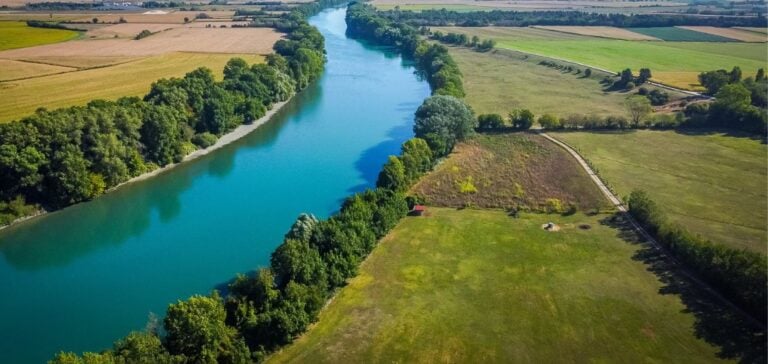The French government has decided not to go ahead with the “Rhônergia” dam project on the Rhône, announced by Compagnie Nationale du Rhône (CNR) on August 29.
This project, located between Saint-Romain-de-Jalionas (Isère) and Loyettes (Ain), aimed to build a hydroelectric infrastructure with a 22-kilometer-long reservoir and a 4-kilometer dike to slow the river’s flow.
CNR had planned a head of 6.8 meters to produce around 140 GWh per year, equivalent to the annual electricity consumption of 60,000 inhabitants.
The estimated cost of construction was 330 million euros.
CNR, which is responsible for 19 hydroelectric dams on the Rhône, has taken note of this decision and has announced a new phase of discussions with the French government to identify alternative projects for managing the river’s resources.
The project, the idea for which dates back to 1935 and which was first abandoned in 1980, represented the last major development of this type on the Rhône.
Despite CNR’s stated objectives of strengthening energy independence and combating climate change, local and regional criticism weighed heavily in this decision.
Reactions from local elected officials and regional mobilization
The mayor of Saint-Romain-de-Jalionas, Jérôme Grausi, expresses his support for this decision, calling it “a relief for the protection of nature, our territory and our identity”.
He highlights the importance of preserving one of the last undeveloped areas of the Rhône, which also contains Gallo-Roman remains.
Grausi insists on the need for vigilance regarding other energy projects, notably the construction of two new EPR2 nuclear reactors at the Bugey power plant, close to the site of the planned dam.
Maxime Meyer, regional councillor for the Ain region and co-chairman of the Ecologistes group at the Auvergne-Rhône-Alpes Regional Council, also welcomes the abandonment of the project.
He points out that the mobilization against the “Rhônergia” project represents hope for those who oppose “large, unnecessary and imposed projects” in France.
Meyer sees this decision as a strong signal in favor of a more balanced and concerted management of energy infrastructure projects.
Implications for regional energy strategy
The abandonment of “Rhônergia” has reopened the debate on the energy strategy to be adopted in the Auvergne-Rhône-Alpes region.
CNR and the French government must now work together to develop projects that respect both environmental constraints and local energy needs.
Emphasis could be placed on smaller infrastructures or on cutting-edge technologies that optimize hydroelectric production without major negative impact.
Future discussions could include options such as reinforcing existing facilities or integrating complementary renewable energies.
The stakes are high, as we need to meet the growing demand for energy while respecting the imperatives of decarbonization.
The region’s role in the national energy strategy will depend on the ability of the players involved to propose innovative and economically viable solutions.
Implications for national energy policy
The cancellation of this project highlights the challenges facing French energy policy, which must reconcile the need to increase the share of renewable energies with the need to guarantee stable and sufficient production.
The Rhône remains a strategic axis for hydropower production, but the management of its resources requires a cautious and concerted approach.
President Emmanuel Macron’s announcement in June of the construction of new EPR2 reactors at Bugey shows that France’s energy mix is still largely diversified.
Future discussions between CNR, the French government and local stakeholders should focus on solutions that combine energy efficiency and social acceptability.
Emphasis could be placed on modernizing existing infrastructures and adapting to climate change.
This decision not to go ahead with “Rhônergia” reflects an awareness of the economic and political stakes involved in major energy projects in the current context.






















